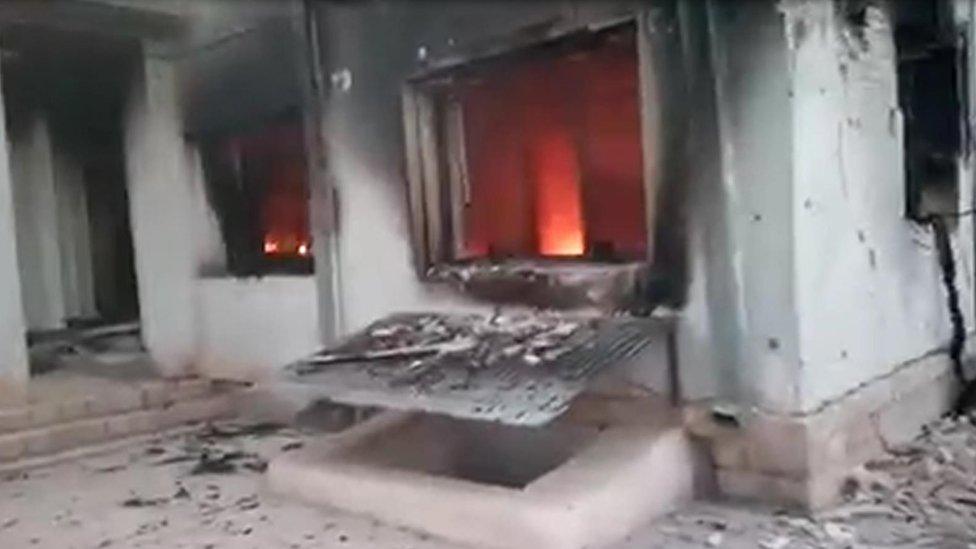Geneva Conventions laws of war 'need fixing'
- Published
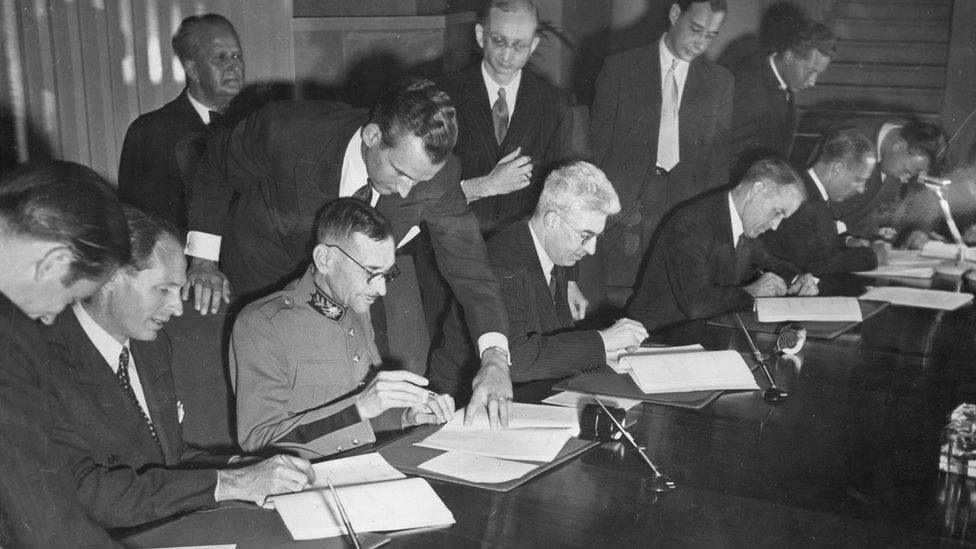
Signing of the Geneva Conventions was considered a major step forward
In 1949, following the horrors of the second world war, world leaders gathered in Switzerland to sign the Geneva Conventions.
196 countries have ratified them, no other international treaty has received such broad support.
These were the rules which were supposed to limit the savagery of war, to protect humanity from another Auschwitz, siege of Leningrad, or Dresden firestorm.
It was an exciting time. The United Nations had been created and the Universal Declaration on Human Rights, external had been drafted.
So heady was the mood for peace that the Swiss government, which had invited countries to Geneva to sign up to the conventions, had to reassure arriving heads of state that while of course the long-term goal was to end war altogether, in the meantime some rules were a good idea.
So how are the Geneva Conventions doing today? Not very well, according to their guardian, the International Committee of the Red Cross (ICRC).
Shattering the conventions
In conflicts from Syria, to Yemen, to Mali, Ivory Coast, Iraq, or Afghanistan, war tactics include siege, attacks on hospitals, sexual violence and the arbitrary execution of detainees.
It all adds up, says ICRC president Peter Maurer, to a "shattering of the system of the Geneva Conventions".
So, this week in Geneva, the 196 countries which signed the Conventions will meet at the International Red Cross Conference to discuss how to fix them.
Joanne Liu, president of the medical charity Medecins Sans Frontieres, will be listening carefully.
When MSF's hospital in the Afghan city of Kunduz was bombed in October, Ms Liu felt "astonishment and outrage".
As the fighting in Kunduz intensified, she had reassured her staff that the Conventions prohibiting attacks on medical facilities would protect them: US and Afghan forces knew exactly where the hospital was.
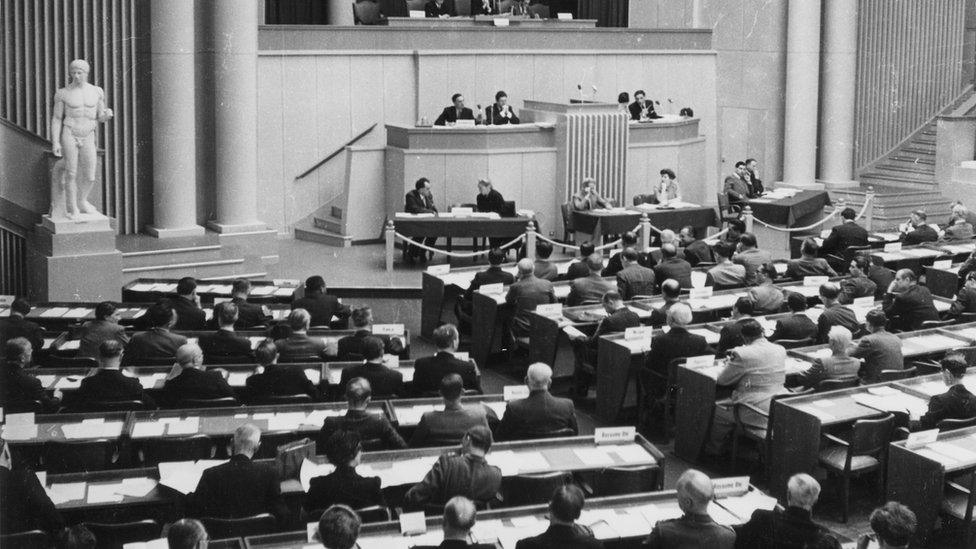
Delegates working on final agreements
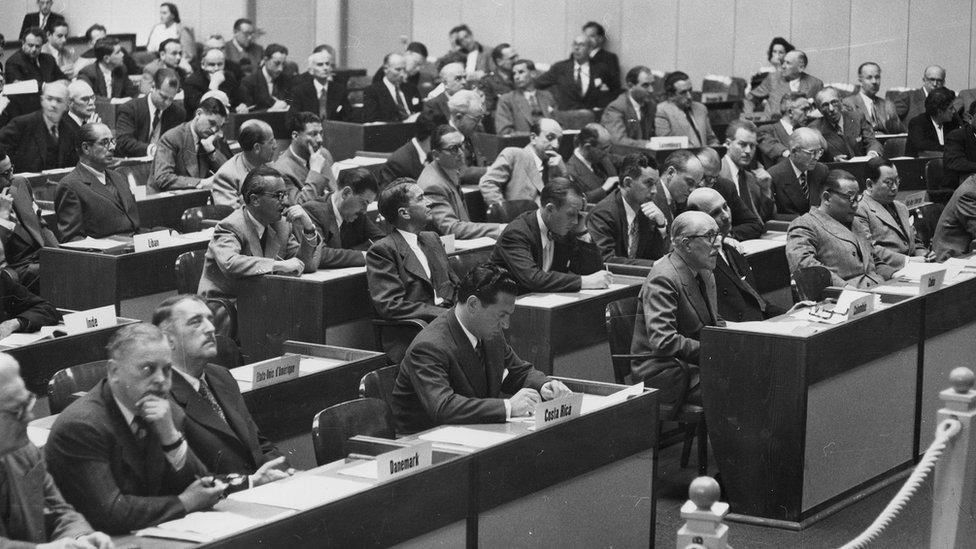
Most of the world's nations signed up
"I told my staff our hospital was the safest place to be," she remembers.
But on the night of 3 October, 30 people, among them 13 MSF staff, were killed in a bomb attack, external lasting an hour.
And although the US says the bombing was a mistake, Joanne Liu wants clarification about how committed states really are to the Geneva Conventions.
Describing the Conventions as providing "all the essentials needed to bring humanity in a conflict", Ms Liu believes that "we would be fine as long as they were respected".
Relevant to modern war?
But, some people question whether the Conventions really apply to modern warfare.
They were written with traditional battlefields and traditional armies in mind.
But where are the battlefields today? At Aleppo's water supply station? In a concert hall in Paris?
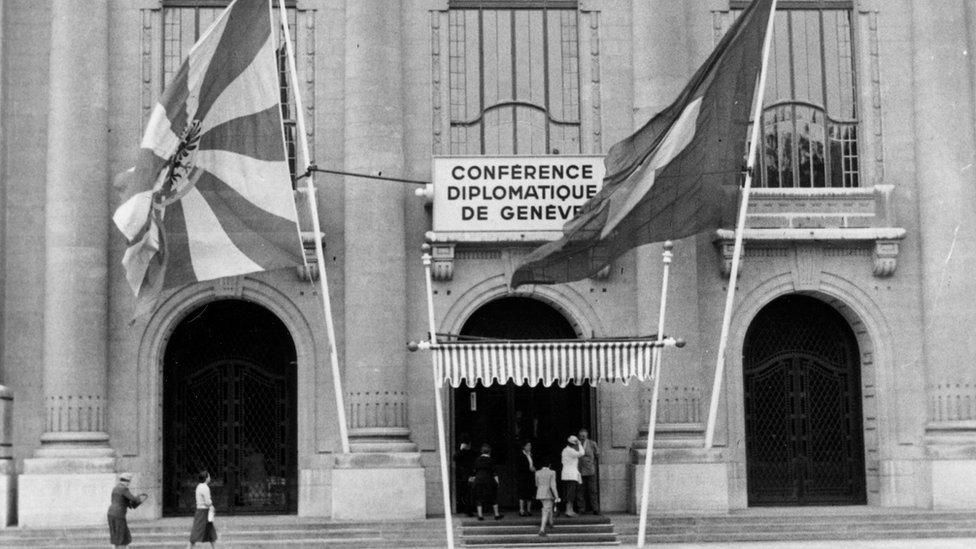
There were lofty aims of ending war altogether
And who are the armies to whom the Conventions apply - so-called Islamic State (IS), the Syrian army, the US airforce?
David Rodin, a moral philosopher and co-director of the Oxford Institute for Ethics, Law and Armed Conflict, points out that "if you look historically at where the law of armed conflict came from, it's about mutually advantageous reciprocity, it's in the interests of both to have some restraint".
He adds: "So what do you do when you have a foe who is not interested in that reciprocity? There's no benefit to us in behaving well if the enemy doesn't."
This might be a seductive line of argument for countries engaged in the so-called "war on terror".
Back in 2002, the Bush administration suggested the Geneva Conventions on prisoners of war would not apply to those captured and taken to Guantanamo Bay.
Mr Rodin, however, cautions against such thinking, saying: "There are things we owe to people simply because we are human beings and we owe them that even if they don't recognise those obligations mutually."
Such ideals led to the Geneva Conventions in the first place and to much of our human rights law - the Convention against Torture, external and the Convention against Racial Discrimination, external.
Wrong climate?
But not much visionary international law has been drafted recently and it is no coincidence that three of the five permanent members of the UN Security Council (the US, Russia and China) have not ratified the International Criminal Court.
States seem increasingly reluctant to adopt international treaties which might impinge on their own national policy.

Geneva Conventions:
The Geneva Conventions are founded on just a few basic principles:
Medical staff and hospitals in warzones must be protected and allowed to work freely.
Those wounded in battle and no longer fighting are entitled to medical treatment.
Prisoners of war must be treated humanely.
Warring parties are obliged to protect civilians (this includes a prohibition on the targeting of civilian infrastructure such as power and water supplies).

Marco Sassoli, professor of law at Geneva University, believes the current climate is not conducive.
"Today, and this is a bad sign for our international society, states would never adopt such protective and detailed conventions as the 1949 Conventions."
Professor Sassoli believes even trying to modernise the Conventions could be "a catastrophe", warning that opening them up might end up weakening rather than strengthening them.
And so member states meeting in Geneva this week will discuss something much more modest: a proposal, drafted by Switzerland and the ICRC, for a forum in which states can discuss the "challenges and issues" relating to the Conventions.
In the hope of getting everyone on board, the forum "will not deal with specific countries or specific situations", explains Swiss diplomat Francois Voeffray, who added that some countries were concerned by the risk of politicisation.
It sounds like a vague talking shop, but if it succeeds it will put all 196 signatory countries, from Syria, to Saudi Arabia, to Yemen, Russia, or the US, in the same room to discuss how to honour the rules to which they have signed up.
Helen Durham, chief legal officer with the International Committee of the Red Cross, believes it could be the start of a very necessary debate - not about whether the Conventions are still relevant, but on how to strengthen respect for laws which she believes are "more precious than ever".
"Within times of armed conflict there is a space for humanity," she insists.
"We have to have laws that find (that) place for humanity and limit suffering. You don't throw out a good law because it is difficult to implement."
- Published3 October 2015
